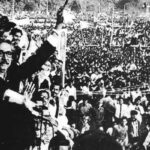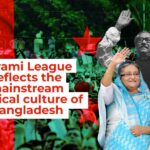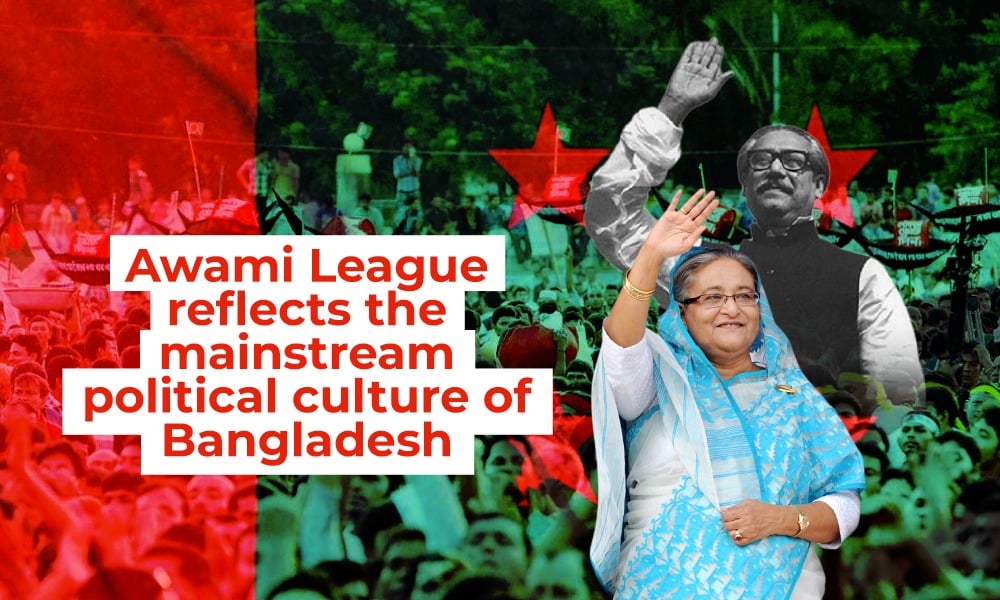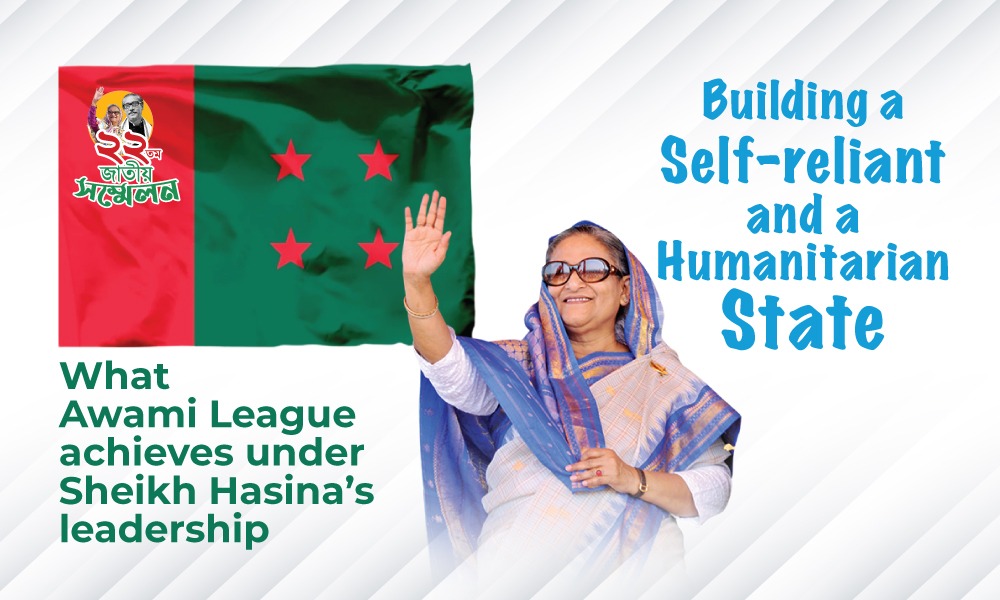The BNP-Jamaat alliance used to attack every peaceful program of the Awami League from 2001 to 2006. They used to disperse the Awami League program by throwing bombs and bullets. Senior leaders of the party were battered on the streets and brutally beaten with sticks. When the central leaders of Awami League went to hold a program in a district town, BNP terrorists would block roads and rivers and carry out armed attacks. During these barbaric attacks, BNP MPs and ministers led the armed cadre forces while police carried out a crackdown on the Awami League supporters. Khaleda Zia’s government even prevented the Awami League president and the then-main opposition party leader Sheikh Hasina from attending social events.
BNP government detained Sheikh Hasina, ransacked the Awami League office and arrested hundreds of leaders and activists
The Jubo League called for a protest rally against the countrywide torture of leaders and activists and the beating of senior leaders on the streets. Hundreds of leaders and activists gathered at Awami League’s party office on Bangabandhu Avenue.
But before the rally started, the BNP-Jamaat government detained Sheikh Hasina and ransacked the Awami League office. Police arrested hundreds of Awami League leaders and activists after charging batons brutally and firing tear gases at them.
The Prothom Alo made headlines with the incident in a report on March 2, 2004, with a photo. The report said the main opposition leader Sheikh Hasina was detained and harassed four times at Elephant Road, Shahbagh, Matsya Bhavan and Zero Point on the way to join the program. Even the leaders and activists, accompanying the car, were severely beaten and arrested under the instruction of the BNP-Jamaat coalition government.
However, Sheikh Hasina reached the Awami League office in the evening amid such obstacles. But as soon as she entered the office, the Khaleda Zia government cut off the electricity and made the entire area dark.
The BNP government used to beat Awami League leaders on hunger strike
The BNP-Jamaat men killed several hundred leaders and activists of the Awami League and maimed thousands from October 2001 to March 2002 – during the first six months of their tenure. Awami League called for a peaceful hunger strike in Dhaka to protest the persecution by the Khaleda Zia government. But BNP ran riots and sabotaged the rally, reported the Janakantha on March 25, 2002.
The report stated that attacks and tear-shell started coming towards senior and women Awami League leaders while they were observing a hunger strike in front of the press club on the morning of March 24. At one point senior leaders of the Awami League, including Mohammad Nasim were arbitrarily caned. Even women leaders of the Awami League were kicked and brutally tortured on the streets.
Asaduzzaman Noor, Sohel Taj, Mohammad Nasim, Matia Chowdhury, and Sajeda Chowdhury were among the senior leaders inhumanly beaten. Some of the senior leaders were whisked off to the hospital with serious injuries.
The senior leaders of Awami League tried to escape from the attack by moving away from the press club to the High Court area, Osmani Udyan and even in front of the party office on Bangabandhu Avenue. But the BNP-Jamaat government attacked and harassed everyone, including the senior leaders Abdus Samad Azad, and Tofail Ahmed.
BNP used to deploy special cadre forces to halt Sheikh Hasina’s rally
After coming to power in 2001, the BNP-Jamaat coalition government used the police and floating people’s platform, ‘Jatiyatabadi Bastuhara Dal to carry out sabotage to halt opposition rallies. The Awami League called for demonstrations at Muktangan on March 28, protesting the attack on the Awami League’s hunger strike and beating of senior leaders on the streets on March 24 in 2002 at the National Press Club.
While Awami League Chief Sheikh Hasina strongly condemned the barbaric attack and indecent behaviour with senior leaders, the BNP-Jamaat people swooped on the peaceful rally. The Janakantha published the report of the brutality with a photo the next day.
At that time, four MPs, connected to Hawa Bhaban, deployed some rootless terrorists along with police who beat women leaders and activists of Awami League mercilessly.
Matia Chowdhury, Segufta Yasmin, Maria, Lipi, Shikha, Helen, Mayor Hanif, Mokhrusur Rahman, and Abdus Sattar among 30 other central leaders were seriously injured in the tear gas.
BNP leaders blocked roads and river ways and fired shots to thwart Awami League rallies
The Awami League announced a protest program in Gazipur’s Kapasia, demanding justice for the murder of hundreds of Awami League leaders and activists nationwide, and brutal attacks on senior leaders in a peaceful gathering in Dhaka.
But BNP leaders, close to Khaleda Zia, called another meeting at the same place at the same time to thwart the Awami League rally. Later, the senior leaders of the Awami League were barred to join the rally at Kapasia Ferry Ghat on the orders of Hawa Bhaban. The BNP-Jamaat government carried out an armed attack and dispersed the gathering to foil the rally.
According to a report by the Janakantha on March 30, 2002, Awami League announced to hold a rally on March 29 in Amraid Bazar playground of Rayed Union in Kapasia. A few days later, Chhatra Dal also announced a counter-rally at the same venue, leading to Section 144 by the local administration. But the terrorists of BNP-Jamaat openly carried out shooting and bomb attacks and demolished the Awami League stage.
To prevent the Awami League leaders from entering the Kapasia rally, BNP set a barricade by burning tires in the bus stand. They even vandalized the Targaon ferry ghat and set fire to shops in Amarid Bazar.
Several senior Awami League leaders were waiting at the Shitalakhsya Ferry Ghat, 10 kilometres away from the venue when the BNP, Jubadal and Chhatra Dal men opened fire at them. Matia Chowdhury, Syed Ashraful Islam, Fazle Rabbi and Azmatullah Khan were among those waiting, and they had to return from the ferry ghat. Hundreds of vehicles were stranded, and people suffered due to the disruption of the ferry for a long time.
BNP carried out a bomb attack on the Awami League house meeting to kill the general secretary
After the elections on October 1, 2001, Awami League called for a post-election meeting on October 15 at Mohna Community Center in Mirpur. BNP leaders and activists led by Ward Commissioner and BNP leader Hasan Ahmed, carried out attacks with firearms and bombs in the house meeting in the presence of Awami League General Secretary Zillur Rahman. The attack left at least six Awami League leaders and activists, including women leader Sheela Malek, seriously wounded. BNP activists also vandalized 12-13 cars.
The Daily Sangbad reported the incident on October 16, 2001. It said that Awami League General Secretary Zillur Rahman survived the attack under police guard with the help of his followers. Later, the law enforcement members recovered the bombs from the scene.
BNP government barred the main opposition leader Sheikh Hasina from going to the wedding ceremony
After formatting the government in October 2001, the BNP-Jamaat did not allow the outgoing Prime Minister Sheikh Hasina to attend social events. Khaleda Zia’s government barred the country’s main opposition leader from attending a wedding ceremony, ignoring the minimum etiquette. The Janakantha published the report on March 17, 2002.
Former Secretary Mirza MA Jalil booked Air Force’s ‘Falcon Hall’ for his son’s wedding reception. He got proper permission from the Air Forces after letting the authorities know about the renowned guests, including the former Prime Minister Sheikh Hasina. But two hours before the event, law enforcers, under the special orders of Khaleda Zia, revoked the permission so that Sheikh Hasina could not attend the wedding ceremony.
The BNP-Jamaat government arrested Chhatra League leaders who came to Dhaka to attend the council
In April 2002, the BNP-Jamaat government ran a crackdown on the Chhatra League leaders who came to Dhaka for the 27th council of the Bangladesh Chhatra League. Without any complaint, police detained Chhatra League leaders who came from all over the country and were staying in 12 areas in the capital, reported Janakantha on April 5.
DB police arrested 25 people from various houses and residential hotels on April 3, followed by Tejgaon police with 22 arrests, Motijheel police with 10, Sabujbagh and Dhanmondi police stations with three arrests each, and Sutrapur and Kotwali police stations with two arrests each. All of them were Chhatra League leaders and activists of different units in the country and shown arrested under section 54.
BNP minister used to shoot fires to foil Awami League programs, Chhatra Dal-Juba Dal carried out brutal attacks
From 2001 to 2006, the BNP-Jamaat alliance carried out indiscriminate killings and massacres of Awami leaders, activists and supporters. In 2006, they were forced to leave power in the face of public anger. The Awami League, which suffered five years of torture, announced a protest rally across the country demanding justice for the persecution. BNP leaders used to shoot at these programs even then, leaving thousands of Awami League leaders and activists crippled and more than a hundred dead by their brutal attack.
On January 9, 2007, the Samakal reported that BNP cadres Salim, Ziku and Kamrul’s forces beat and chopped the Awami League and Chhatra League leaders in Chandpur town on January 4. When Awami League leaders went to see the injured leaders in the hospital, the BNP-Jamaat alliance again attacked them on the hospital premises. BNP leader and former state minister Ehsanul Haque Milan led the open fire, leaving Kachhua Chhatra League president Kamal Hossain Titu bullet-wounded.
In Rangunia of Chhatagram, at least 23 leaders and activists were seriously injured in the attack by the cadres of Khaleda Zia’s advisor razakar Salahuddin Quader Chowdhury during a protest rally of Awami League and its allies, Chittagong. They, however, survived the bullet attacks after being taken to Chittagong Medical College Hospital on an emergency basis. Even BNP leaders beat Chhatra League leader Delwar Hossain to death in Bashankhali.
BNP cadres brutally attacked five Awami League workers in the Banglabazar area of Barisal’s Banaripara for attending Awami League’s party program demanding fair elections. Even the Chhatra League leader’s hand was severed in front of his house in Bakerganj. BNP activist Masum’s armed cadre force chopped off the hand of Mamun, Vice President of Faridpur Union Chhatra League of Bakerganj Upazila with a Chinese axe.
The BNP-Jamaat alliance did not only kill and torture party cadres but also filed false cases against hundreds of Awami leaders and activists in Khulna. Their appointed party police arrested six people in the night and tortured them in custody. That is how BNP-Jamaat tried to keep Awami League away from political programs by prosecuting its leaders and activists.






